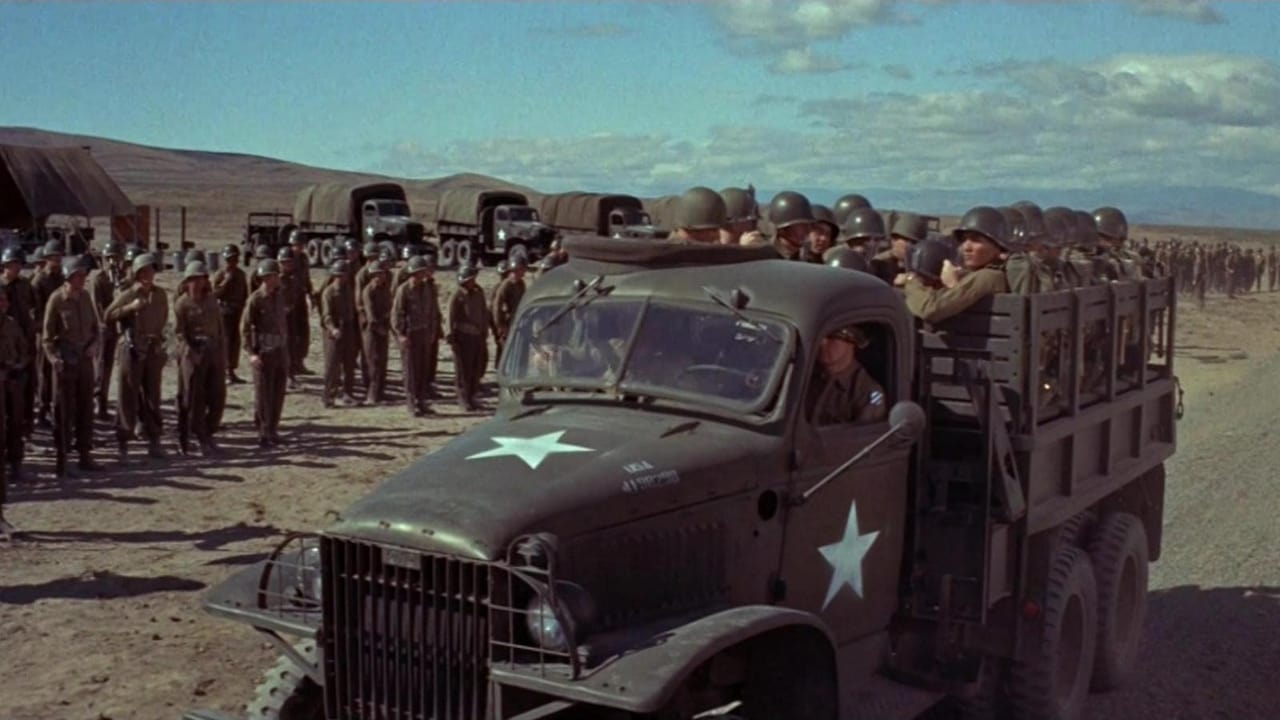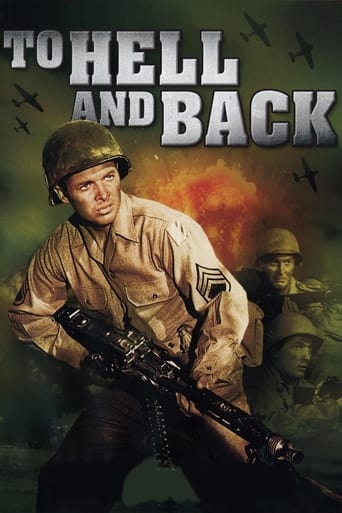

I was moved by this autobiography based film about the most decorated soldier of WWII, Audie Murphy. The actor deserved another medal for reliving his heroic, but traumatizing life as a combat soldier. The film begins in 1937, with Murphy's very humble beginnings as a young boy in northeast Texas. His father has abandoned the family and twelve year-old Audie is supporting his ill mother and seven younger brothers and sisters, by working for a neighbouring farmer. Four years later, just as the attack on Pearl Harbor happens, Audie's mother dies, and painfully he is forced to remand his siblings to the state orphanage. In desperate need to raise enough money to support them, Audie turns to the military, and the film takes you on his journey through the war. The battle sequences depicting Murphy's astounding heroic exploits are excellent and Audie Murphy's performance and delivery is very even-tempered, which helps to maintain the reality of the story. The supporting cast is strong with reliable performances delivered from actors, Marshall Thompson, Charles Drake, Jack Kelly and David Janssen. Yes in today's film world of superior special effects and high definition, and if this film was made today they probably would of went to Europe to film right on location, but I found this 1955 film hits the mark adequately. This truly touching picture is well worth a look.
... View More*Spoiler/plot- To Hell and Back, 1955. The most decorated soldier in WW2 Audie Murphy portrays himself in this battle Saga of the Third Infantry Division. A true story of the famed Texas youth and the heroic stories of his squad's members battles in Sicily, Italy and France.*Special Stars- Audie Murphy, Marshal Thompson, Jack Kelly, Paul Picerni, Denver Pyle, David Janssen, John McIntire: Narrator, Gen. Walter Bedell Smith.*Theme- Good American values work every time.*Trivia/location/goofs- Mr. Muphy was awarded his medals at the age of 19 and entered the US service at 16 years old. Mr. Murphy did NOT wish to play himself because he thought the public would think bad of him and wanted Universal Studios newcomer, Tony Curtis to play the role. Mr. Murphy was often compared to WW1 reluctant hero, Sgt. Alvin York. German tanks are actually newer Patton I US tanks of the Korean war era. Germans' wear WW1 helmets with the temple lugs in this film.*Emotion- If you try to compare this WW2 film to todays digital films, it won't satisfy you. However if you compare this war film with others of special note like 'Battleground' and 'A walk in the Sun'; this film is very interesting and well worth your attention. The fact that it is starring the very person who really lived this war time experience, this film is a special gem. I would rather see the real hero play himself than be dissatisfied with a pale substitute lead actor in such an important role. I think Tony Curtis would have not done the important role well. This film is a classic and a history lesson about a true American hero that suffered the rest of his life for his bravery to serve this country.
... View MoreThis autobiographical account of the exploits of Audie L. Murphy as the most decorated American soldier of World War II makes for a good--but not great--traditional military movie where everybody obeys orders and few complain about serving in the infantry. "Ride Clear of Diablo" director Jesse Hibbs and "Saskatchewan" scenarist Gil Doud has fashioned a solid, unpretentious combat movie that opens with a brief prologue about our protagonist and the rigors that he endured as a teenager. Murphy had no father. The man abandoned his family and left them to fend for themselves with our hero setting aside his eighth school education to earn money for his mother and his brothers and sisters.The outbreak of World War II prompted Murphy to enlist, but the Marine Corps and the Navy rejected him for his size. He stood five feet five inches and must have looked even scrawnier in real life. Eventually, Murphy made it into the Army, but Hibbs and Doud skip his basic training and have him showing up in North Africa as a replacement. The commanding officer of the outfit is somewhat surprised when Murphy puts in a request to transfer to the paratroopers. Initially, the C.O. wants to transfer the ailing Murphy out because of his poor health on the trip to North Africa (Murph had never been on a ship) and put him in with the cooks. Murphy asks them to forego any special treatment. Nothing happens for our heroes in North Africa, but they get their taste of combat in Sicily and later the Italian campaign. Everybody in the outfit sets out to protect little Audie, but by the time that it is over, he has risen to the rank of lieutenant and he is the one watching out for them.What sets this combat film apart, aside from its infantry perspective, is the appearance of two genuine Sherman tanks--which while they may not be the same models that plowed through the fields of France--are a rarity in World War II movies, especially during the 1950s. Hibbs includes the famous scene where Murphy single-handedly stalled a German advance by manning a .50 caliber machine gun on a blazing tank. His superior officers wanted to ship Murphy off to West Point, but those ambitious plans were sidetracked when Murphy suffered a war wound that disqualified him for the academy. Marshal Thompson, who played the replacement in the Battle of the Bulge movie "Battleground" is cast as a fellow G.I. along with Jack Kelly who later attained fame on the "Maverick" television series with James Garner. Murphy has a brief interlude with a spunky Italian babe, Maria (Susan Kohner in her film debut), but they never get it on with fireworks to boot. Basically, "To Hell and Back" covers the war from North Africa to France without too much fanfare on the part of the protagonist. The theme of friendship is explored in some detail. Nobody wants to make friends under such stressful conditions because their friends wind up dying under fire and the separation is agonizing for them. The action ends with Murphy receiving his decorations. The Germans are pretty much depicted as extras in long shots without any interaction between themselves or the Americans.
... View MoreI cannot understand why a man like Audie, certainly a man with character, let it happen that he was misused for this propaganda film. This film is of the same indescribable, ridiculous stupidity as most war films that were produced as long as the Germans and the Japanese were the bad guys. I watched it horrible 60 minutes long, still waiting for something positive. In vain. It is remarkable that - the longer the time runs since WWII - war films are becoming more realistic and "fair" with the former enemies. Compare this Audie film with the last film of Clint Eastwood or even Soldier Ryan (which has still a lot of unbearable patriotism).I am bored to look these films in which the US-boys are always: 1. outnumbered by the red-Indians, Huns, Japanese, Spanish whereas the historical record has it that more often it was vice versa 2. the enemy always has the bigger weapons, the better equipment, the better support etc, whereas in reality it was more often vice versa 3. the US heroes are mostly shot from behind, there is no other way to overcome them! They are always character better. Believe me, if you have two armies with 100 thousand young men between 18 and 30 the percentage of good guys and bad guys is on both side the same, as well as the percentage of mothers who swear an oath that their boys are good boys - right so as well as wrong so! All of these 3 typical Hollywood-war-film-points are displayed in this film. Audie played it like that because the film-makers ordered him to do so. This was his earnings. He died young. Maybe he could not live very long with these lies or he became sick of being a hero that felt to be useless for normal peace-time-life. Maybe his biographical war-time-story was a total fake. America needed a hero like that, because America lacked of true heroes. The American soldiers had hardly any chances to become heroes as it was looked for it that they got as often as possible their exchange at front. Air fighters for example had ten times less service at the front than Germans. The care the Americans took for their men should be hailed, where lives counted much contrary to totalitarian systems where human lives count nothing. So, if the story of Audie was true, it was not a typical story of an American soldier in the last war. Anyway human acts should be hailed as heroism, not exterminating humans which is always a multiplication of human tragedies (think of all the mothers and fathers, wives, children). If You want to know how the war was ask one of those who were really at the front and whom you know as reliable and honest people. If you believe in these propaganda Hollywood movies you fall in the same pit as so many of Your nation. You will have to pay the bill. Trust in God and You will thrive, not in Your own weakness! He can win Your wars for You, if You leave him, no more.... I know that the readers do not like to read this comment, which is so hostile to their liking, but soldiers who fought at the front mostly do not like glorifying films either. There is no room in reality to glorify people for killing others. Following orders might be a necessary act to survive and to fight against evil (which Nazi-terrorism or Stalin-terrorism were) and banish it from the face of Earth. But this is nothing heroistic. Germans or Japanese who fought against the overwhelming powers of the Allies committed also "heroic" acts (and wasteful as well!), but for what good? In our days it is only acceptable to show films which demonstrate the necessity to fight against injustice and evil, but at the same time the barbarism and cruelty of war. I do not understand the reason for that kind of American film-making. It must be an exaggeration of patriotism as I do not believe that Americans have a minority complex, which is often the reason for hubris. This exaggeration is self-deceit and also very dangerous, because it blindens oneself for reality which in the long run has very negative effects.
... View More